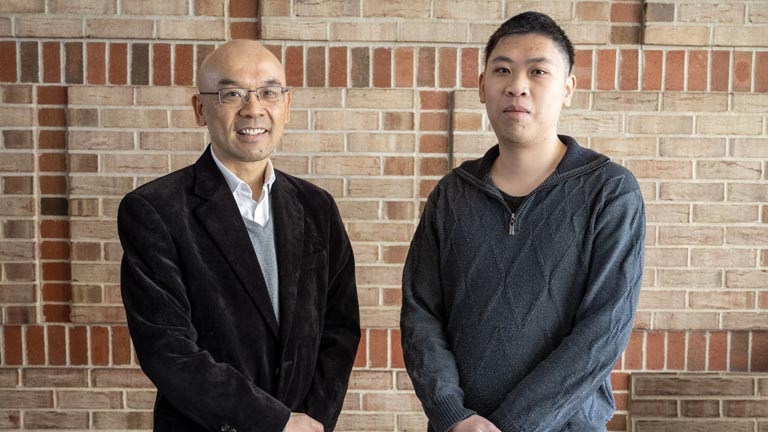January 22, 2025
MULTICOM excels in five critical categories at the prestigious Critical Assessment of Structure Prediction.

A Mizzou Engineering team recently ranked in the top five in five different categories at an international protein prediction competition.
The biennial Critical Assessment of Structure Prediction (CASP) aims to advance the field of protein structure prediction. When a protein’s structure is unknown, researchers try to predict it and thereby determine its function. With this knowledge, they can accelerate advances in medication development and other fields.
Nearly 200 predictors from academia and industry competed in the highly prestigious CASP16, using both human and server techniques. There, the Mizzou MULTICOM team took first place for predicting protein complex structure without stoichiometry information.
MULTICOM’s main student contributors were postdoctoral fellow Jian Liu and graduate students Alex Morehead and Pawan Neupane. The team was led by Jianlin “Jack” Cheng, Curator’s Distinguished Professor of Electrical Engineering and Computer Science.
MULTICOM represented Mizzou prominently at CASP16, achieving more top rankings than any other group in the competition and delivering three invited talks.
In total, MULTICOM predictors built on their success at CASP 15, performing strongly in five critical categories:
- First in protein complex structure prediction without stoichiometry information (Phase 0)
- Second in protein tertiary structure prediction
- Second in estimating the global fold accuracy of protein complex structures
- Third in protein complex structure prediction with stoichiometry information (Phase 1)
- Fifth in protein-ligand structure and binding affinity prediction
“MULTICOM’s performance demonstrates that the protein bioinformatics research in our Department of Electrical Engineering and Computer Science is world-class,” Cheng said. “Mizzou Engineers have the ambition, talent and skills to develop innovative solutions to address very important and challenging scientific and engineering problems that have fundamental impacts on our society, economy and technological development.”
Accelerating disease treatment
Proteins carry out numerous biological functions, such as catalyzing chemical reactions, transporting nutrients and immune protection. A protein’s function is largely determined by its structure.
Knowledge of protein structure and function is important for drug design, disease treatment and biomedical research, among other fields, and has wide applications in medicine, agriculture, bioenergy and biotechnology development.
In the real world, the structure of many proteins is unknown. That’s where protein structure prediction comes in.
“Better and faster protein structure prediction can help speed up drug design and discovery, reducing the cost of drug development,” Cheng said.
Deep learning and protein prediction
Protein structure prediction has advanced since CASP15 in 2022. Interest in CASP16 grew after the 2024 Nobel Prize in Chemistry was awarded to the developers of AlphaFold2, which won the 2020 CASP14 competition.
CASP16 saw the release of Google’s AlphaFold3 prediction system. AlphaFold3 can predict interaction between proteins and molecules such as RNA, DNA and other small molecules that AlphaFold2 could not predict.
“Quickly and effectively adopting AlphaFold3 was important for achieving good performance at CASP16,” Cheng said.
“Our extensive experience from previous CASP competitions also provided valuable insights for fine-tuning our methods and overcoming challenges during the competition, guided by the leadership and expertise of Dr. Cheng,” Liu said.
“CASP offers a unique opportunity to tackle real-world protein structure prediction challenges where there are no predefined answers, making it an exciting platform to push the boundaries of computational modeling,” Liu said. “The potential to improve human health through better structural insights and contribute to scientific discovery has been a constant source of motivation for me.”
Advance the frontier of engineering research and development. Choose Mizzou Engineering graduate study.